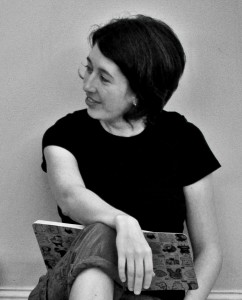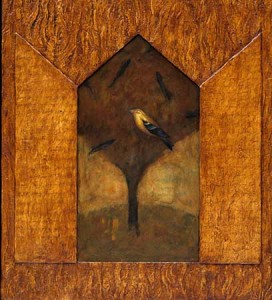Mary Akers: Hi, Randon. Thanks for agreeing to talk to me today. I loved your essay “Advent” in this issue. It spoke to me and stayed with me, which I think is a fine testament to any piece of writing. And actually, this may be our “Faith & Doubt” issue, but as I was assembling it, I realized it could just have easily had a theme of…oh, something like “Haunted.” We have a full-length essay On Hauntedness (in poetry), and in the first line of your piece, you say your grandmother “haunted our house like a pink ghost.” Then again, maybe anything that touches on the idea of “recovery” by its very nature involves some sort of haunting. It occurs to me that authors can be haunted–as evidenced by our repeating themes–but a particular work can also be “haunting.” What themes do you think “haunt” your work? And what do you think makes a piece of writing read as haunting?
Randon Noble: Hi, Mary. Thanks for your kind words about “Advent” and for asking such a provocative first set of questions!
I actually think “hauntedness” is a theme that haunts my work. I usually wind up writing about things that have grabbed me and won’t let me go: a near-death experience, a lost love, an unpreventable tragedy, a time in my past that I can remember but never return to. In each of these cases something was alive, died in some way, and came back – but not entirely comfortably. Hauntedness feels different from something like nostalgia. Nostalgia may be bittersweet but there’s a pleasure to the pain. When you’re haunted it’s not pleasurable – you may feel curiosity, passion, longing – even companionship – but there an uneasiness to the relationship, which is what makes me feel so compelled to write about it, whatever “it” is.
MA: Of course. That makes perfect sense–hauntedness as a theme. Why didn’t I think of that?
I’m interested in the ways that authors respond to the work chosen to illustrate their pieces–especially how often they find a personal meaning in the image that I couldn’t have known about when pairing illustration and written word. What did you think of the painting selected to illustrate your piece? Did it have any special meaning for you?
RN: I love it! When I was in graduate school one of my teachers, Chuck Wachtel, told us, “I am an ornithologist but also a bird.” He was reminding us that even though he was our teacher, he was also a writer. When I was teaching I tried to remind myself of that same fact and wrote “Also a bird” on an index card and tacked it above my office desk. Birds continue to feel resonant in my work – using Aesop’s “The Bat, the Beasts and the Birds” to figure out what kind of writer I am, seeing the image of my writing “fluttering” at the margins of my life as a mother, and, in more recent work, thinking about ravens and doves as messengers and birds in general as a source of augury. “Private Devotion” seems the perfect image to accompany “Advent” in particular as well as my writing in general.
MA: Also a bird. I love that. And speaking of what we are and how we define ourselves, in your bio, you use the term “essayist” to describe what you do. I really like that. I think it’s good to be specific. To tell people what you do, and how you want to be known, right up front. It also occurs to me, that in the French sense of the word “essay” (essayer: to try), all writers are essayists, as we are all trying to convey meaning or emotion or time, distance, space, etc, with words. On the best days, this seems like a wonderful, lofty, possible thing. On the worst days, it seems like such folly. I mean, really. Symbols on a page? Who are we kidding? There’s no emotion in hash marks. And yet….we still manage to somehow make this amazing brain transfer every time we write and someone else reads it. Could you talk a little bit about that brain transfer, and also about your decision to go with “essayist” rather than “writer” or “non-fiction” writer, or some other term?
RN: When I was in graduate school a classmate once said that calling yourself a writer was like knighting yourself: you can’t do it; someone else has to do it for you. Publication was the sword on your shoulder, the seat at the round table. Once I was published I felt like I could call myself a writer more comfortably. But becoming a self-proclaimed essayist was a little more complicated.
One of my first published essays got the attention of an agent. She read the manuscript of the collection I had put together, took me to lunch at Nobu, and signed me. I was over the moon! Here it was – the dream come true. But then the dream dissolved. My agent wanted me to rewrite my collection of essays into a memoir and I couldn’t do it. It felt like filleting all the lovely skeletons I had worked so hard to craft and leaving 250 pages of meat and tissue. I said no, and we broke up. For a while I was crushed. But I kept thinking about what I really wanted to write – toyed with the idea of memoir, and of biography – and kept coming back to essays. So I decided to declare it and live it: I am an essayist.
MA: You write a lot about relationships in your work. Past and present love relationships, family relationships, the joys and trials of motherhood. Having written a few personal essays myself, I know that there is often (always?) a small (huge?) frisson of anxiety associated with “putting oneself out there.” How do you push past that and write what you need to write anyway?
RN: I usually write without self-censoring and then see what I have. There are essays I have written and put away. There are essays I’m glad were rejected because now (a few months or years later) I’d rather keep them to myself. (George Saunders once said at a reading that he was grateful for every rejection because it kept him from publishing work that was not his best – what a wonderful way to think about it!) I also have a few trusted readers, including a friend who is about ten years older than I am and very wise; she helps me see obstacles and objections that I might not.
MA: And a related question, how do you balance, as a parent…okay, I’ll say it, I’ll bite, how do you balance as a MOTHER (that sacred title that everyone calls into question when we write honestly about our human lives) knowing that what you share with the world your children will one day grow up and read. They will see what you have written and possibly feel exposed themselves, or embarrassed, or proud, of course, or they will look for pieces of themselves, as my children do, even when it’s fiction–and they’ll find it, too. How do you balance that with your need/desire/commitment to tell the honest truth?
RN: So far I’ve only had to think about this for two years – that’s how old the twins are. Whatever I wrote before they were born, before I had any idea they might be born, well, that ship has sailed and there’s nothing I can do about it. But there’s also nothing I want to do about it. Eventually I want to the twins to see me as a whole person – not just their mother. And part of being a whole person is not knowing how to make eye contact with a stranger you’ve seen naked, or being reluctant to let a love affair go, or being a little cavalier with your life when you’re young. I don’t want to set myself up as a perfect image they feel they have to emulate. I’d rather show at least a little of the seams, the work, and the ache that sometimes comes with living. Maybe it’s naïve to think this way, but sometimes naivety and stubbornness can force a whole new way of living in and looking at the world.
MA: Rereading that last question of mine, those words, “the honest truth,” seem like such a silly choice. Isn’t all truth honest? But maybe not. I can’t bring myself to edit those words, so maybe they are the honest truth themselves. How about the hard truth? The naked truth? Or we could go even farther and say the God’s honest truth? Did you ever notice how many people throw a qualifier at the word truth? Shouldn’t the truth (like the cheese) stand alone? What’s that about?
RN: I love your invocation of the cheese that stands alone! But maybe the truth is like Swiss cheese. There are always holes in it because of our human perceptions. And the holes in Swiss cheese are caused by a certain bacteria that eats the lactic acid and “burps” out carbon dioxide that leaves the holes. Even cheese holes are part of a living biological process – as is the truth.
But I think that truth-telling in essays is essential. I want essays to spin meaningful gold from the straw of real life. Anything else feels like cheating. (Although I will confess that I find myself intrigued by others’ thinking about the truth – David Shield’s Reality Hunger really challenged me, his How Literature Saved My Life knocked my socks off, and Pam Houston’s writing, fiction or non-, completely engages me – in part because she once said that 80% of everything she writes is true.)
MA: Whose work do you read when you want to read the God’s honest truth?
RN: Tolstoy’s Anna Karenina, Cheryl Strayed’s “The Love of My Live,” Terry Tempest Williams’ Refuge and When Women Were Birds, Pam Houston’s Contents May Have Shifted, Paul Crenshaw’s “After the Ice,” William Manchester’s A World Lit Only By Fire.
When I want to see the truth: Life at Home in the Twenty-First Century, the photographs of Diane Arbus, Rembrandt’s late self-portraits.
When I want God in there I might look to Thomas Merton’s journals or The Rule of St. Benedict. Or Rembrandt.
MA: What are you working on now? Do you have a full-length manuscript in the works?
RN: I am currently working on a new collection of essays – trying to find a theme and a shape for it. This conversation has helped a great deal!
MA: And finally, what does “recovery” mean to you?
RN: The first thing that comes to mind is a passage from The Faerie Queen (which I always hear in Alan Rickman’s voice as Colonel Brandon in Sense and Sensibility when he reads to Marianne near the end of the film):
What though the Sea with Waves continual
Do eat the Earth, it is no more at all;
Ne is the Earth the less, or loseth ought:
For whatsoever from one place doth fall,
Is with the Tide unto another brought:
For there is nothing lost, that may be found, if sought.
I think of recovery as the return of something lost. And now I feel like we’ve made a full circle back to “hauntedness.” Maybe recovery is its opposite.
MA: I think you’re right. And what a great place to conclude our discussion. Thanks again, Randon. It’s been delightful talking with you.



Pingback: Advent | Rkvry Quarterly Literary Journal
Pingback: Advent | Rkvry Quarterly Literary Journal
Pingback: “Advent” by Randon Billings Noble | Rkvry Quarterly Literary Journal